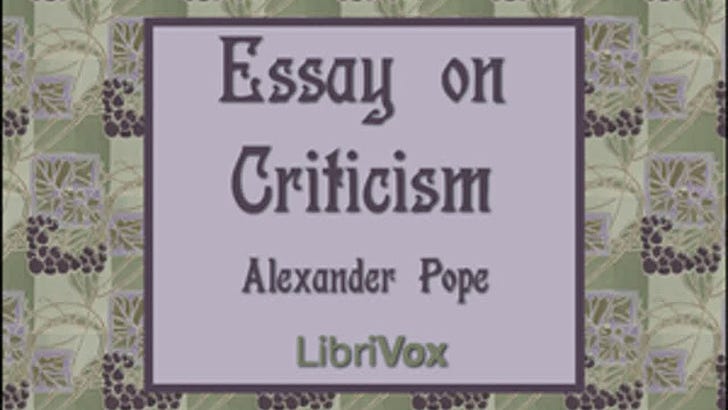'Tis with our judgments as our watches, none/ Go just alike, yet each believes his own
Rezensionsunwesen und schlechte Autoren, die sich überschätzen, eine never ending story, wohl schon zu Zeiten von Alexander Pope. 1711 erschien dieser Essay on Criticism in Gedichtform und da bekommen ALLE ihr Fett weg vom Autor über den Kritiker/Rezensenten zu Leser. Seine Ratschläge gelten (leider) immer noch uneingeschränkt auch für (amazon) Rezensionen und (indy) Autoren.
17/18 Authors are partial to their wit, 'tis true / But are not critics to their judgment too?
28/29 In search of wit these lose their common sense / And then turn critics in their own defense
36/37 Some have at first for wits then poets passed / Turned critics next and proved plain fools at last
203/204 Pride where wit fails steps in to our defense, / And fills up all the mighty void of sense.
263/264 Most critics, fond of some subservient art, / Still make the whole depend upon a part:
412/413 Some judge of authors names not works, and then / Nor praise nor blame the writing, but the men.
426/427 So much they scorn the crowd that if the throng / By chance go right they purposely go wrong:
Sogar an Produktrezensenten hat Pope gedacht: Du sollst schlechte Produkte nicht hochjubeln…
562/563 Tis not enough, taste, judgment, learning, join; / In all you speak, let truth and candor shine:
Dieter Nuhr scheint auch nur frei nach Pope zu zitieren: „Wenn man keine Ahnung hat, einfach mal Klappe halten.“ 566 Be silent always, when you doubt your sense;
Letztendlich kann man die letzten 5 Zeilen jedem (amazon) Rezensenten ins Poesiealbum schreiben:
The learned reflect on what before they knew
Careless of censure, nor too fond of fame,
Still pleased to praise, yet not afraid to blame,
Averse alike to flatter, or offend,
Not free from faults, nor yet too vain to mend.
Wer hätte das gedacht, eine komplette Kritik des aktuellen Rezensionsunwesens, von Hochjublern über (Autoren-)Fans, zu Pseudointellektuellen, alles schon mal dagewesen vor über 300 Jahren.



